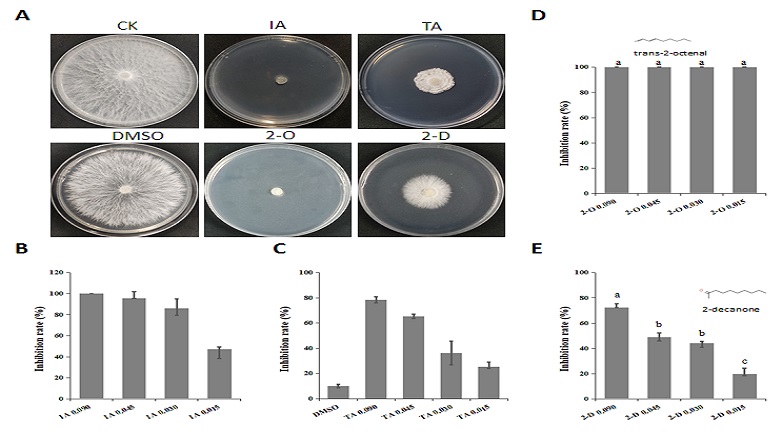
Recently, the Green Low-Carbon Production Technology Innovation Team from the Institute of Bast Fiber Crops, Chinese Academy of Agricultural Sciences (IBFC, CAAS) isolated a broad-spectrum and highly effective endophytic Bacillus velezensis SEC-024A from the leaf tissue of industrial hemp. Through series of experiments, the study analyzed the mechanism of inhibition and screened the active substances.
Hemp (Cannabis sativa L.) is globally cultivated for agricultural and industrial purposes. It is widely used to produce pharmaceuticals, textiles, biofuels, building materials, paper products, insulation materials, etc. The increase in production of C. sativa has been associated with rising frequency and severity of fungal diseases, including the emergence of new diseases, i.e., root, crown and bud rot induced by Fusarium, Botrytis and Sclerotinia in hemp. Biological control has emerged as an efficient and sustainable method that uses beneficial microorganisms or microbial metabolites to control this disease.
An endophytic bacterium SEC-024A was isolated from the leaf tissue of industrial hemp. SEC-024A exhibited a significant antagonistic effect on A. rolfsii , with a plate inhibition rate of 80.5% and a pot control effect of 74.1%, and effectively suppressed the growth of various phytopathogens, including Magnaporthe oryzae, Thanatephorus cucumeris, and Ralstonia solanacarum, etc, representing a promising candidate from which to develop a control agent against this disease. Genome-wide analysis revealed that SEC-024A has abundant secondary metabolite synthesis-related gene clusters, the effective inhibitory component test further revealed that the volatile organic compounds (VOCs) produced by SEC-024A strain play a key role in the inhibitory antagonistic process. Four compounds were founded exhibiting efficient inhibitory effects on pathogens from the VOCs of SEC-024A-isobutyric acid, tiglic acid, trans-2-octenal, and 2-decanone, whose EC50 values against A. rolfsii , were respectively 0.012, 0.038, 0.009 and 0.046 μL/mL, respectively. Trans-2-octenal was verified to show broad-spectrum inhibitory activity against soilborne disease pathogens of various cash crops. B. velezensis SEC-024A holds promise as a novel microbial agent for controlling diseases.
This research was funded by the Innovation Project of the Chinese Academy of Agricultural Sciences (CAAS) and the Hunan Provincial Key Laboratory of Agricultural Biogenomics of Traditional Chinese Medicine.
The study titled “Biocontrol potential of Bacillus velezensis SEC-024A against southern blight of industrial hemp” has been published online in “Industrial Crops & Products” and can be accessed through the link : https://www.sciencedirect.com/science/article/pii/S0926669024017448

Fig. Negative impacts of VOCs generated by SEC-024A on A. rolfsii.

